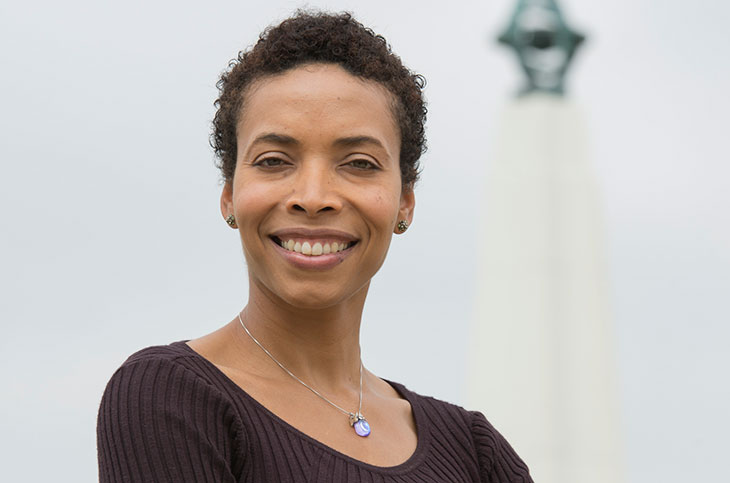Aomawa Shields

Editor’s note: Shields has continued to explore the cosmos since this profile was published. In a NOVA video released in Sept. 2018, she discusses her passions and the trajectory that led to her current role as exoplanet astronomer. Click here to watch.
Sipping hot cocoa before dawn at the Grainger Observatory during her upper year, Aomawa Shields ’93 didn’t mind the cold or even waking up at 4 a.m. to join her physics classmates in observing Jupiter’s moons with a telescope. “I have never forgotten that moment,” Shields says.
“Even though astronomy has become very remote controlled, what originally drew me to [it] was just being outside and looking up at the stars.”
Last summer, Shields received her Ph.D. in astronomy and astrobiology, and she’s now doing postdoctoral work at the University of California, Los Angeles and the Harvard-Smithsonian Center for Astrophysics—thanks to a National Science Foundation fellowship. Shields is continuing her research on the potential habitability of planets found orbiting red dwarf stars. She is also dedicating a portion of her fellowship to the creation and launch of an interactive astronomy workshop geared toward young girls of color in middle schools.
“That’s the age when girls start to become quiet, not raise their hands as much, and become more concerned with outward appearances and less about being proud and confident in what they are learning,” Shields says. “I really wanted to get those girls early and expose them to all different types of astronomy education.”
Called “The Universe: More than Meets the Eye,” Shields’ workshop is designed to be metaphoric—to reveal not only the hidden truths behind a planet’s superficial appearance, but also behind a person’s. Venus, she says, “might look like this gorgeous planet, but if you get on the surface, it would melt you in seconds. We’ll be learning a lot about those types of misconceptions about the universe…and we’ll be involving the [students’] own personal backgrounds and experiences…with astronomy.”
Shields’ background is a significant catalyst in the development of her program, and in her completion of a Ph.D. after a long absence from academia. She is candid about saying that she chose Exeter, in part, because it had its own observatory, which she was proctor for during her senior year. But Shields became a star in her own right, landing her first acting role (Trudy in Steel Magnolias) during her lower year, after auditioning on a whim. “Exeter in general made me feel like I could do anything,” she reflects. “I was able to do astronomy, a theater show practically at every turn, and also play violin in the orchestra and chamber orchestra.”
Exeter led to MIT and an undergraduate degree in earth, atmospheric and planetary sciences. That was initially followed by enrollment in a Ph.D. program; but Shields’ theater chops had been further flexed at MIT, so she chose to pursue an MFA in acting at UCLA, which she completed in 2001. In the years that followed, Shields ultimately found ways to marry her two passions, including as a TV host and field reporter on PBS’s “Wired Science” and as a guest scientist on programs produced by the Discovery and History channels. Her curriculum vitae lists memberships in both the American Astronomical Society and the Screen Actors Guild, and in 2012 Shields won the Audience Choice award at FameLab, a national science communication competition.
“Research alone is not where my path lies,” Shields says. “Communication of some sort is a large part of my life. When I feel most fulfilled is when I’m interacting directly with people of all ages.”
That interaction between science and the general population is a role that Shields is eager to expand upon with her postdoctoral work—particularly in her outreach efforts. “As a young girl of color, I didn’t remember seeing a lot of role models that looked like me,” she says. So she wants to make science more accessible, to demonstrate that scientists do look like her, and even like her colleague who competes in roller derbies and dresses in Goth. The universe is full of revelations.
— Karen Ingraham